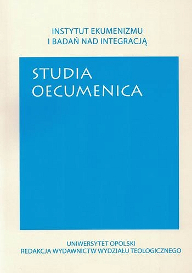Psychosocial determinants of religious/denominational conversion: a person – environment fit perspective
Psychosocial determinants of religious/denominational conversion: a person – environment fit perspective
Author(s): Dariusz Krok, Ivana OleckáSubject(s): History of Church(es), Environmental interactions, Biblical studies, Sociology of Religion
Published by: Uniwersytet Opolski
Keywords: religion; conversion; religious changes; person – environment approach; func- tional fit;
Summary/Abstract: Religious or denominational conversion is a complex process that involves various psychosocial factors. One theoretical framework that has been utilized to comprehend the determinants of religious conversion is the person – environment fit model. This study examines the role of personal and socio-cultural factors that play a significant role in conversion processes within a person – environment fit perspective. The analysis demonstrates that individuals are more likely to convert to a new religion or denomination when they perceive a good fit between their personal and socio-cultural characteristics and the characteristics of the religious or denominational environment. Personal factors that may influence the decision to convert include: personality traits, values, beliefs, and thinking styles, while socio-cultural factors comprise: socialization, familial and cultural norms and standards, and social integration processes. Moreover, both categories of factors interact in the conversion process, influencing potential decisions to convert to varying degrees. When an individual’s religious beliefs, values, and norms align with those of a newly encountered group, they are more likely to identify with the group’s goals and mission.
Journal: Studia Oecumenica
- Issue Year: 2023
- Issue No: 23
- Page Range: 297-314
- Page Count: 18
- Language: English

